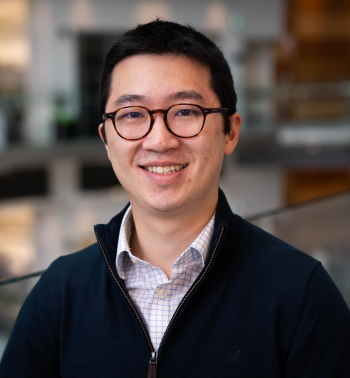5 June 2025
Funding from the King's Health Partners (KHP) Centre for Translational Medicine has given Dr James Sun fully protected research time, providing the opportunity for valuable in vitro laboratory research in the quest for personalised treatments for patients.
What is your role within KHP?
I am a KHP Centre for Translational Medicine (CTM) Pre-doctoral Clinical Research Fellow. I am mainly based in Dr Foad Rouhani’s laboratory at the Francis Crick Institute where I conduct my research. I am also a hepatology registrar and with my secondary supervisor, Prof Alberto Sanchez-Fueyo. I have one liver transplant clinic per week at King’s College Hospital NHS Foundation Trust (FT) and I am a sub-investigator on a CAR-Treg clinical trial.
Please describe your research and how you came up with the idea
My supervisor has previously shown that somatic mutations are acquired in the liver in steatotic and alcohol related liver diseases. These change the behaviour of liver cells and point towards cellular pathways involved in the diseases.
Primary sclerosing cholangitis (PSC) is a rare liver disease affecting the bile ducts. We do not fully understand the cause; it affects young people and is associated with a significantly increased risk of bile duct cancer. I therefore wanted to explore whether there are somatic mutations in bile duct cells in the PSC and how they might be contributing to disease.
How is funding from the KHP CTM helping to develop your study?
I am grateful to the KHP CTM for funding this one-year pre-doctoral fellowship which has given me fully protected research time. The in vitro work in the laboratory would not be possible while working on a clinical rota. This has enabled me to generate preliminary data and work up an external PhD fellowship application. I have additionally secured a project grant from a national patient charity, PSC Support.
What is the potential of your research to benefit patients with PSC?
This research could provide us with a detailed understanding of the biological processes involved when bile duct cells become diseased in PSC. This could benefit patients through personalised medicine in two ways:
- we may be able to identify new drug targets to delay or reverse the progression of PSC;
- the development of genetic tests that identify patients at higher risk of progression or cancer development in PSC.
How has working within KHP along with the Francis Crick Institute helped progress your research?
I have been able to access liver tissue from King’s College Hospital NHS FT’s liver biobank which enables the research that I am doing. I have also formed collaborations with clinicians such as Dr Deepak Joshi who is an expert in PSC. At the Francis Crick Institute there are unrivalled science technology platforms which have helped me get the project off the ground and are providing me with invaluable training.
The Centre for Translational Medicine brings together the organisations of King’s Health Partners and generous funding from the Guy's and St Thomas' Charity to work in partnership to improve the health of people locally, nationally, and globally.
This is through accelerating research and innovation that improves the detection, prevention, and treatment of disease.
The Centre for Translational Medicine aims to:
- address the major health burdens for local, national, and global communities – and to challenge existing health inequalities;
- combine our outstanding clinical and scientific expertise to deliver excellent outcomes for patients;
- develop the next generation of clinical-academic leaders, skilled in delivering impactful translational biomedical research.
For more information about the Centre for Translational Medicine and its funding offers, email: translationalmedicine





